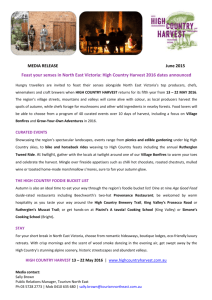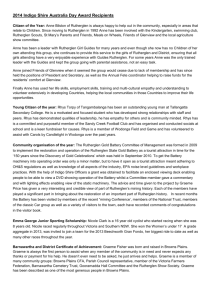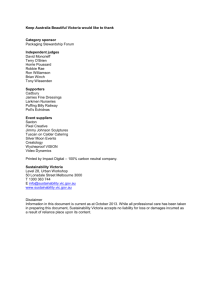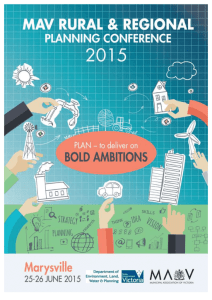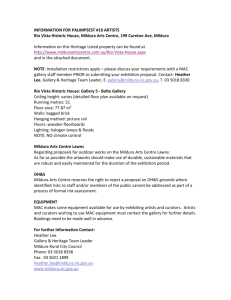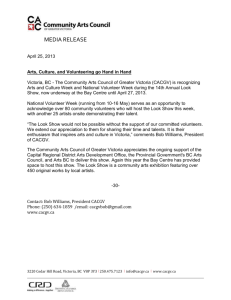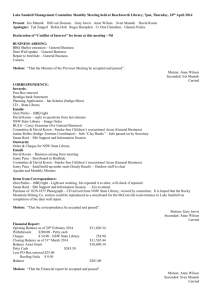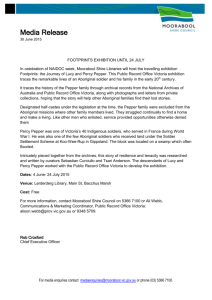DOC | 50KB KABV Tidy Towns Awards 2014 ceremony booklet Word
advertisement
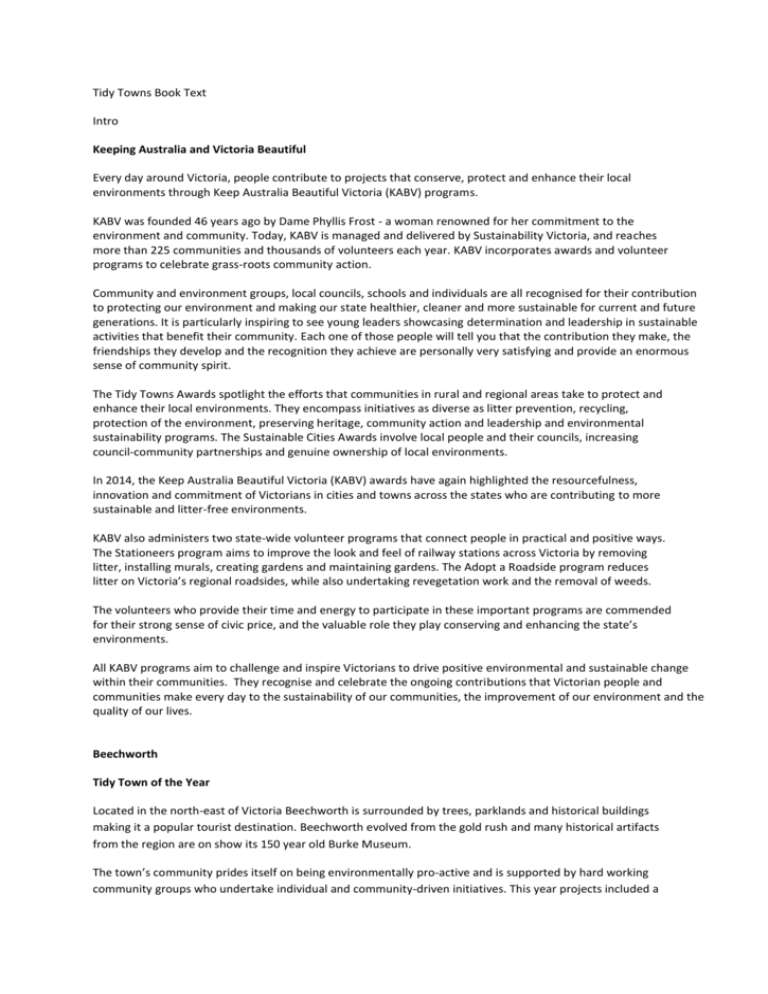
Tidy Towns Book Text Intro Keeping Australia and Victoria Beautiful Every day around Victoria, people contribute to projects that conserve, protect and enhance their local environments through Keep Australia Beautiful Victoria (KABV) programs. KABV was founded 46 years ago by Dame Phyllis Frost - a woman renowned for her commitment to the environment and community. Today, KABV is managed and delivered by Sustainability Victoria, and reaches more than 225 communities and thousands of volunteers each year. KABV incorporates awards and volunteer programs to celebrate grass-roots community action. Community and environment groups, local councils, schools and individuals are all recognised for their contribution to protecting our environment and making our state healthier, cleaner and more sustainable for current and future generations. It is particularly inspiring to see young leaders showcasing determination and leadership in sustainable activities that benefit their community. Each one of those people will tell you that the contribution they make, the friendships they develop and the recognition they achieve are personally very satisfying and provide an enormous sense of community spirit. The Tidy Towns Awards spotlight the efforts that communities in rural and regional areas take to protect and enhance their local environments. They encompass initiatives as diverse as litter prevention, recycling, protection of the environment, preserving heritage, community action and leadership and environmental sustainability programs. The Sustainable Cities Awards involve local people and their councils, increasing council-community partnerships and genuine ownership of local environments. In 2014, the Keep Australia Beautiful Victoria (KABV) awards have again highlighted the resourcefulness, innovation and commitment of Victorians in cities and towns across the states who are contributing to more sustainable and litter-free environments. KABV also administers two state-wide volunteer programs that connect people in practical and positive ways. The Stationeers program aims to improve the look and feel of railway stations across Victoria by removing litter, installing murals, creating gardens and maintaining gardens. The Adopt a Roadside program reduces litter on Victoria’s regional roadsides, while also undertaking revegetation work and the removal of weeds. The volunteers who provide their time and energy to participate in these important programs are commended for their strong sense of civic price, and the valuable role they play conserving and enhancing the state’s environments. All KABV programs aim to challenge and inspire Victorians to drive positive environmental and sustainable change within their communities. They recognise and celebrate the ongoing contributions that Victorian people and communities make every day to the sustainability of our communities, the improvement of our environment and the quality of our lives. Beechworth Tidy Town of the Year Located in the north-east of Victoria Beechworth is surrounded by trees, parklands and historical buildings making it a popular tourist destination. Beechworth evolved from the gold rush and many historical artifacts from the region are on show its 150 year old Burke Museum. The town’s community prides itself on being environmentally pro-active and is supported by hard working community groups who undertake individual and community-driven initiatives. This year projects included a comprehensive guide to encourage consumers to source fresh food from local growers, and habitat protection to ensure that Beechworth remains unspoiled for future generations. Beechworth boasts the highest density of rooftop solar panel installation in Victoria and is set to embark upon the Indigo Shire’s community energy generation project. From 1926 until 1946 Beechworth’s energy was powered by the Crossley Engine Plant which was recently refurbished and rehoused by members of the Old Cranks Motor Club and Rotary. This project is an entrant in this year’s awards. The town’s schools are engaged in environmental management both within their schools and by assisting community groups. St Joseph’s Primary School has been working with North East Catchment Management Authority to create a frog bog at the school. This will be an outdoor learning space that will also increase bugs in the Beechworth ecosystem. Entrants in the award’s Young Leaders category are the Youth Health Crew who share health and wellbeing information with the youth of Beechworth. Members of the group are undergoing training in first aid, youth mental health first aid, prevention of alcohol and risk taking behaviour, sexual health and peer support so that they can help and support their friends and those in need. Several community groups run programs to reuse items that would previously have been sent to recycling or waste. The Quercus Community Bookshop is a social enterprise run by the Beechworth Neighbourhood Centre to redistribute books donated by the community. In their daily endeavours to recycle, the Tidy Towns committee created a blanket out of the old Beechworth Visitor Information Centre vests after a new uniform was introduced. Each vest was deconstructed - zips went to the op-shop for reuse and the material from the vests was made into a warm blanket for the centre. Beechworth’s community is committed to increasing sustainable practices that protect and enhance. This commitment makes Beechworth the 2014 KABV Tidy Town – Sustainable Community. Campaspe Bordered by the Murray and the Goulburn Rivers in northern Victoria, Campaspe covers a huge area which is dominated by irrigated agriculture and a landscape that is visually defined by a network of irrigation and drainage channels. The local economy is based on agricultural production as well as tourism. Council is well supported by the local Landcare groups which undertake projects to revegetate and maintain biodiversity in their community. A successful waste education program - WICKED (Waste In Campaspe – Know, Educated Do) - was launched this year. The program focuses on council providing education to reduce waste, prevent litter and conserve resources. The key aim of the five-year program is to create a more sustainable and engaged community that is aware of the social, economic and environmental benefits of changing their habits. Kyabram’s St. Augustine’s College, which includes primary and secondary students, has also demonstrated leadership in reducing waste, increasing recycling and reducing litter by building resource recovery and waste reduction into the curriculum. Cohuna Cohuna is a lively town situated on the banks of the beautiful Gunbower Creek. It is home to an energetic community committed to recycling, revegetation and caring for their town. Cohuna boasts a number of community groups which work together to enhance the local environment. These include schools, the Progress Association, Leos, Lions, Men’s Shed, Women on Farms, Friends of groups, Scouts, Cubs, Guides, the Historical Society and the proud residents of Cohuna who collect litter on their daily walks. The clearing of invasive species and planting of 1200 plants has rejuvenated Gilrule and Mitchell parks and walking tracks. The projects undertaken by the Gunnawarra Shire and the hard working community include development of a magnificent area with a fishing platform and a canoe launch. Walking tracks have been created which are being used by residents to ride their bikes (rather than driving their cars) when visiting town, while also helping to increase awareness of native plants and birds. Horsham Located in the Wimmera, the community of Horsham takes immense pride in maintaining the environment. The Horsham Tidy Towns Committee, Horsham Rural City Council and the Wimmera Mail Times work together on programs to keep Horsham litter free and to support council’s zero tolerance attitude to illegal dumping. To retain the history of the town, Horsham Tidy Towns Committee coordinated a project to restore a wagon as a tribute to May & Millar, the manufacturers and benefactors to the community. With both monetary and in kind support from Horsham service clubs and other interested parties (including 700 hours of skilled carpentry, painting, planning and dedication) stage one of the May & Millar wagon project is complete. This is one of the many projects undertaken by the town’s community which is committed to sustainable practices. Rutherglen Rutherglen is a community nestled in a special corner of north east Victoria bordered by the Victorian Alps to the south and the Murray River to the north. While the town’s foundations were built on gold, it is a passion for producing great wine that has shaped the town over the past 150 years. Rutherglen’s main street maintains its historical charm, with most of the shop fronts retaining the same look they had a century ago. The community, supported by the Indigo Shire, includes a strong network of local community groups and schools with a commitment to sustainability and heritage. A number of initiatives entered into the awards this year have included preserving history and honoring citizens who have made significant contributions to the region. Rutherglen Primary students have also run a program delivering a message encouraging the community to “Buy Recycled Products First”. Wangaratta The 2013 Tidy Town of the year winner, Wangaratta, has continued on its sustainable journey this year. Council is well supported by numerous enthusiastic community groups and schools which provide hundreds of volunteer hours. The Wangaratta Sustainability Network created the Carp Muster - a fun program to protect the environment by removing carp from the creeks while educating participants on the problem of alien fish in waterways. The small schools at Myrrhee and Whitfield are educating the children to be sustainable in their everyday lives with recycling and reuse programs and are learning the benefits of growing vegetables at school. Facilitated by the North East Multicultural Association, the Migrants’ Journey initiative is a collaborative effort involving various subsets of the local community. This project recognises the importance of cultural heritage for north east Victorians and celebrates the significant contribution post war migrants make to the community. Dame Phyllis Frost Award – Audrey Hurst Audrey Hurst has been a stalwart in Dimboola, probably for more years than she would like to recall! Audrey has been actively involved in community work through the Lions Club of Dimboola where she has held numerous committee positions including a year as the District Chair and participates in the Good Friday Royal Children’s Hospital Appeal, Driver Reviver stop and numerous other Lions projects in and around Dimboola. She is also on the Dimboola Town Committee where she has acted as treasurer. Audrey has organised and submitted the Tidy Towns entries since 2000 through the ever changing formats, freely giving her time talking to community groups and schools convincing them that their entry is well worthy of recognition and will benefit the town. The KABV judges have enjoyed Audrey’s tours around the projects spruiking the achievements of Dimboola at every opportunity. Once judged, Audrey arranged the Tidy Towns Regional Presentations for entrants and finalists in the awards and has travelled the state representing Dimboola at the annual Tidy Towns awards celebrations. Audrey has been a long time employee and contributor to the Dimboola Banner, retiring after 15 years of service in 2010. She has returned as a volunteer news contributor ensuring the community activities in Dimboola are acknowledged. Audrey was named the Dimboola Town Committee’s Australia Day Volunteer of the Year in 2013. In her spare time Audrey is a fitness fanatic who can be regularly found at the Dimboola gymnasium and has regularly completed marathons and walks to raise money for charity. Tidy Towns has been a huge part Audrey’s life and we are proud to name her as this year’s Dame Phyllis Frost winner. Active Schools Myrrhee Primary School Making Days Myrrhee Primary School encourages the local community to get involved with the school to promote sustainability and learning. Located high in the hills, this isolated and beautiful school boasts 14 students. Thursdays are dedicated to Making Day, when students negotiate with staff, parents and the local community to select a project. Students write plans and approach community members to become involved and help them. Projects have included welding art sculptures from scrap steel selected by students from local scrap metal yards, using local timbers to create fine pieces of furniture with help from a local craftsman, and making delicate bowls and jugs with assistance from the local potter. Students raised money by holding an annual dinner and auction where they sell their craft items. A special treat is the lunchtime pizza made by year 6 students in the school's pizza oven, using mainly schoolgrown vegetables from the kitchen garden hydroponic hothouse. The garden is supported by an aquaponics installation that uses fish to clean the water. Highly Commended Mildura West Primary School Students Enviro Teams = Sustainable Actions Mildura West Primary School forms a series of Enviro teams annually, including Sustainability Ambassadors, Environmental Leaders, Student Representative Council and the Enviro Team. The Environmental Leaders are mentored by older students to support sustainable actions throughout the school and community. Sustainable actions include planting trees, reducing litter and caring for wildlife. St Joseph’s Catholic Primary School Beechworth Be Active in Caring for the Environment St Joseph’s primary developed a Strategic Environmental Management Plan to guide the future of the school. A projects completed as part of the plan include installation of five water tanks and solar panels, waste- recycling, re-using and composting, building a chicken shed, introduction of a produce table for vegetable swaps and a sustainability electives program. St Joseph’s is a participant in the Resource Smart Schools initiative. Finalists Children of East Gippsland and Gaia Guardians Environment Trust Our World, Our Voice. Messages and Pearls of Wisdom for Humanity Rutherglen Primary School Thinking Beyond Team St Joseph's Primary School Crib Point St Joseph's Café St Mary's Primary School Cohuna Green Team St. Augustine's College Kyabram Reducing Waste for a Cleaner, Healthier School Clean Beach Waterways Lake Sambell Management Committee Community and Indigo Shire Lake Sambell Bird Hide Project 850 seedlings were planted as part of a project undertaken in July 2013 to regenerate Lake Sambell’s beautiful Emma George garden that had been destroyed by nine years of drought. In August 2014 a further 440 seedlings, purchased with the assistance of Indigo Shire Council, will be planted. The replanted garden has transformed Lake Sambell reserve into a haven for birds. Recent bird sighting have included up to eighty resident bird species includes waterbirds, and many migratory bird species. Three identification and conservation storyboards for the bird hide help visitors identify the birds and their conservation status with guide symbols to provide food source and habitat information. It was decided it was also time to refurbish the bird hide. The installation of the storyboards was conducted as part of a bird hide refurbishment and planting project undertaken by the Lake Sambell Management Committee with support of community volunteers, Beechworth Prison outdoor gang and Jenny Pena from Indigo Shire Council who designed the art work for all three large storyboards. Highly Commended Cohuna Neighbourhood House, Gannawarra Shire, Friends of Gilrule Park Gilrule Park Over 2000 volunteer hours have contributed to the transformation of Gilrule Park, near the centre of Cohuna, from a neglected area of land to a peaceful little piece of bushland in the middle of town. Volunteers have cleared the park of weeds and invasive species, and planted 1200 indigenous shrubs and trees. Finalists Dimboola Boat & Water Ski Club Picnic Bend Upgrade Dolphin Research Institute 'i sea, i care' Walk for Western Port Natimuk Lake Foreshore Committee and Caravan Park Natimuk Lake Wangaratta Urban Landcare, Rural City of Wangaratta, Scouts and Guides Ovens River Rejuvenation - Northern Beaches Area Community Action over 3000 Wangaratta Sustainability Network “Let’s Go Fishin” Carp Muster Following the 2010 floods, Wangaratta’s One and Three Mile creeks were overtaken by carp - an invasive species. Wangaratta Sustainability Network has since worked with Landcare, schools and community groups to reduce this pest, and in 2012 and 2013 400 competitors took part in “Let’s Go Fishin” Carp Muster days. Participants from Wodonga, Indigo and the Wangaratta shires fished European carp from the creeks that wind through Wangaratta. The Carp Musters formed part of an awareness program highlighting the problem of alien fish in waterways and attendees were educated on using sustainable practices when disposing of the carp. Messages were reinforced by guest speakers and displays showing the effect of carp on native fish. The community was informed that carp shouldn’t just be left on the bank, and that they can be eaten with a little thoughtful preparation or can be simply recycled into liquid fertilizer. Bass Coast Shire Council Ramp It Up Pelican Park Recreation Centre and Hastings Community Multiple Sclerosis 24 hour Mega Swim Western Port Secondary College Community Spiral Meditation Garden Community Action population under 3000 Rutherglen Historical Society Every Picture Tells a Story The community of Rutherglen, schools, past pupils and the historical society created a photographic display of the early life and times of St Mary's Primary School and Mt Carmel Secondary School. Information and photos were sourced from the Rutherglen community, archives of the Presentation Sisters in Gardenvale as well as archives from the Sandhurst diocese. The photos include the first group of nuns who came to Rutherglen Mount Carmel convent in 1901, day students and boarders, the building of the second convent in 1924, and St Mary's church that was burnt down in 1961 followed by the building of the new church and its opening. Each of the small crumpled photos were cleaned and scanned with the final three hundred photos professionally enlarged and arranged on mats. Names of people or events were included on the photos ready for public display. The opening of the show drew a crowd and the Rutherglen Historical Society will ensure this archive remains in safe hands. Finalists Arts Rutherglen Sculpture Trail Committee Recycled art Beechworth Rotary Club and Beechworth Old Cranks Motor Club Crossley Generator Project Chiltern Tidy Towns 150 Years of Community Service -The Post Office Cohuna Women On Farms Committee Some Style about Town Dartmoor & District Progress Association Inc. Working Together Community Government Partnerships Horsham Golf Members and Horsham Rural City Council Horsham Golf Club Horsham Golf Club was a victim of the 2009 Black Saturday bushfires. The club was devastated losing its clubhouse, maintenance sheds and equipment as well as flora and fauna. The intense fire sterilised the soil necessitating a great deal of work to re-establish plants. Since then, many local organisations and individuals have banded together to rehabilitate the site. Club members collaborated with Horsham Rural Council to apply for grants for the rehabilitation works from federal, state and bush fire relief sources in excess of $1,450,000. The volunteer Board members have been incredibly supported by people who joined the 15 sub-committees currently in operation plus many other volunteers. The newly built clubhouse compliments the prestigious golf course currently ranked 9th best public course in Victoria. Every accomplishment starts with the decision "I'll try". Horsham’s achievements to date will determine tomorrow's success. Highly Commended Sunraysia Sustainability Network and the Mildura Rural City Council The Mildura Eco Village The Mildura Eco Village is part of a multi stage community project providing community sustainability and environmental education. The community project was developed in partnership between the Sunraysia Sustainability Network community group which comprises over 80 members and the Mildura Rural City Council. Other organisations involved in the project include SuniTAFE Mildura, the Mildura Christie Centre and the Mildura regional waste management group. Finalists Coal Creek Community Park and Museum The Indigenous Learning Stone Project at Coal Creek Indigo Shire and Local Landcare Groups Healthy Woodlands, Happy Barking Owls Members of U3A Mornington and Mornington Park Primary School Musical Memories Mornington Secondary College with Community Community and Government Partnerships North East Multicultural Association North East Multicultural Aged Care Connections Cultural Heritage Wycheproof Historical Society Mt Wycheproof Museum When Wycheproof Primary School relocated, the vacant 1957 built school was retained due to its historical value to community. Supported by school principal Christine McKersie, Wycheproof Historical Society took custodianship of the old school building to create the Mt Wycheproof Community Museum. Avid collector and owner of the Willandra private museum, Mick Giddings, kindly donated much of his large collection of artefacts and Wycheproof memorabilia. Wycheproof Historical Society and a team of volunteers worked for months to transform and preserve the almost derelict building. Museum Victoria’s community consultant Euan McGillivray advised the group and volunteers on preservation and display techniques to create static displays preserved for visitors and residents. A combined celebration was organised to preview Mt Wycheproof Community Museum and celebrate the 120th year of the school. Over 500 people attended the event Not only is the historical building now preserved but it provides visitors an insight into the community’s history. Highly Commended Rachael Croucher & Whitlands Planning Group Settlement of a Victorian Tableland The Whitlands Progress Association is almost one hundred years old and was originally initiated to develop a community in hard and isolated times. With only 33 residents, Whitlands is a small community but one with a fascinating history of early settlers and English migrants. The Association has recorded this valuable history including that of the Post Office, school, community groups, farming life, religion and importantly, Whitland’s families, in a book titled ‘Settlement of a Victorian Tableland : The History of Whitland’s, its People and their Memories’. Finalists Chiltern Recreational Park Committee of Management Inc. Chiltern Grandstand Restoration Coal Creek Community Park and Museum Coal Creek Community Park and Museum 40th Birthday Coal Creek Community Park and Museum A Question of Honour Cohuna Neighbourhood House, Cohuna Historical Society and Cohuna Landcare Mitchell Park, Historical Creek Walk and Shop History Signs Horsham East Rotary Club and Horsham Lions Club May & Millar Wagon Restoration Volunteers and Staff of Burke Museum, Beechworth 150th Anniversary Exhibition: Treasures of the Burke Museum Environmental Sustainability Sunraysia Sustainability Network and the Mildura Rural City Council The Mildura Eco Village After three years of community consultation the Mildura Eco Village - one component of an 11 acre multistage community precinct project- is now complete. The community precinct includes a sustainably built education centre which serves as the administration area and a teaching hub delivering sustainability and environment programs to local primary schools and the community. The Eco Village demonstration sites include Photovoltaics monitoring and a solar distillation park there are also community gardens. The centre provides opportunities for hands-on education encouraging visitors to live and work sustainably while developing strong regional networks. The Eco Village is a well-designed space for the community to come together to share ideas. The Mildura Eco Village is the product of a partnership between the Sunraysia Sustainability Network community group which comprises over 80 members and the Mildura Rural City Council. Other organisations involved in the project include SuniTAFE Mildura, the Mildura Christie Centre and the Mildura regional waste management group. Highly Commended Beechworth Urban Landcare and Sustainability Group Patch to Patch Pedal Day On this special day, nine of Beechworth’s best backyard fruit and vegetable gardens were on display. Visitors rode their bikes along a special route to visit the gardens. The town’s old train station was used to host a food growing festival with a pop up café selling local produce, seedlings, a pop up vegetable garden display and a Landcare marquee distributing food growing show bags. Finalists Dimboola Tidy Towners VRI Development Shire of Campaspe WICKED Education Program Litter Prevention Barwon Regional Waste Management Group (BRWMG) A Cleaner Coast, Geelong and Otway’s is in your hands BRWMG’s Litter Prevention Taskforce developed a campaign based on the Victorian Litter Action Alliance Roadside Litter Prevention Kit's best practice approach to litter prevention. The campaign targeted the Great Ocean Road, the Otway’s, and Geelong city with the tagline "A Cleaner Coast, Geelong or Otway’s is in your hands - stop litter where it starts – report litterers" which calls on the community to report litterers using mobile devices. A partnership was developed with local businesses and fast food outlets to displayed campaign posters in drive throughs and windows, outdoor banners and bin stickers promoting the Environment Protection Authority (EPA) Victoria's litter report website. Billboards were displayed on major roadsides, visitor information centres, caravan parks and at community events. Volunteers conducted roadside audits, and Department of Justice corrections teams and Adopt a Roadside groups conducted roadside clean ups. These efforts resulted in a 30 per cent reduction in littering and a 30 per cent increase in reports to the EPA. Finalists Cohuna Community, Gannawarra Shire and Lions Club Great Town Mornington Peninsula Shire Hastings Clean Team Protection of the Environment The Beechworth Treescape Group Mayday Hills Flora When alerted to the fact that after 150 years of public ownership the former Mayday Hills asylum site had been sold, the Beechworth Treescape Group decided to collect data in a bid to ensure the rich botanical value would be retained. The group collected data and images of 215 trees were recorded. This work culminated in 120 nominations to Indigo Shire Council’s Significant Tree Register, 120 nominations to the National Trust of Australia (Victoria) for trees of state or regional significance, and the preparation of public information for guided walks. The National Trust added 62 Mayday Hills trees or stands of trees to its Register of Significant Trees. This is the largest collection of Trust classified trees in Victoria. Mayday Hills is now recognised as being among the top five collections of planted trees in Victoria and Indigo Shire Council has amended its planning scheme to recognise the importance of these trees. Highly Commended Rural City of Wangaratta Plume Positive Project Plume Positive is a project focused on areas of the Wareena Wetlands affected by a pollution plume created after an industrial toxic spill in 2011. Wangaratta Council worked in partnership with local environment organisations to deliver community events including tree planting, water watch sessions, nature walks and information sessions. Street tree planting screens the industrial area and improves air quality, while community projects restored a positive perception of the area. Finalists Bill Chambers, Rosewood Winery Long Term Environmental Commitment Koyuga Kanyapella Landcare Group Caring for the environment of Koyuga and Kanyapella Kyabram Urban Landcare Group Kyabram Urban Landcare Group Projects Sustainable Living in the Mallee Nyah West Road Rejuvenation Project Wimmera River Improvement Committee Burnt Creek Waterway Enhancement Project Resource Recovery and Waste Management Bass Coast Shire Recycle 100%: A targeted education program for positive behaviour change Bass Coast Shire’s kerbside collection includes 23,000 households and commercial properties across 800km 2. In 2012 the council ruled it an offence to contaminate recycling bins with non-recyclable items. Poor recycling practices contributed to significant loss of recyclable materials sent to landfill and adding $180,000 annually to the cost of disposal. The council researched local, state and national waste education resources to create a program for Bass Coast homes and businesses. Bins were checked, a sticker was applied and an education pack left for those who were not recycling correctly or who had a contaminated bin. Council's kerbside recycling data reflects an overall positive trend since the project commenced July 2013. The number of contaminated bins identified reduced by 65 per cent in six months, and the significant reduction in 'repeat offences' indicated the success of the educational efforts. The environmental and economic benefits of this project mean it will continue, facilitating positive behaviour change across the diverse community. Highly Commended Axis Worx employees Pipeline Plastic Recycling Project To alleviate stress on landfill, employees from Axis Worx – a not-for-profit disability enterprise that provides supported employment for people with disabilities - cut up 100 tonnes of plastic lining from the GWM Water pipeline for recycling. The plastic can be processed into agricultural film, industrial bags and concrete underlay. Finalists Beechworth Community, Indigo Shire, and Beechworth Correctional Work Gang Green Waste Disposal and Timber Stock Pile Beechworth Neighbour Centre and Volunteers Quercus Community Bookshop Shire of Campaspe New Kerbside Waste Management System Reduces Waste To Landfill in Campaspe Young Leaders Sam Mitchell - Orbost Sam is a determined and adventurous young leader. A 19 year old engineering student from Orbost and a committed environmentalist, Sam has little interest in transport reliant on fossil fuels. He wanted to build a bike that ran on solar energy, so he did. He built the bike with a solar panel sheet sitting on the top of the bike’s A-frame. This solar charges a battery and turns the pedals. In March 2013, Sam set off from the Orbost Sustainability Festival to ride his bike around Australia. It took nine months to pedal from Victoria up the east coast, across the Northern Territory, down the coast of Western Australia and back across the Nullarbor. Sam’s aim was to travel to the four compass points of the mainland and cover about 25,000km spreading the message about renewable energy and sustainable travel. Sam’s nomination is well supported by the Orbost community. Orbost Secondary College principal Heather Macalister says that Sam has always had a passion for the environment. “Sam has a quiet determination and inner strength which has been evident throughout the time I have known him. Even in his early years of secondary school his affinity with nature and appreciation for the environment was clearly evident. His resourcefulness and independence saw him take on a great many challenges, not least was his weekend cycling or hiking into remote locations. Sam shared his appreciation for the environment with his peers in outdoor education studies. That Sam was able to achieve the challenge of cycling around Australia was no surprise to any of us who know him.” Finalists Cohuna Leo Lions Club Youth Garden FLIC - Future Leaders Influencing our Community No Talent Required - youth event Mornington Peninsula Shire Youth Services Team 'Adopt-A-Hotspot' Rutherglen Primary School -Thinking Beyond Team Thinking Beyond St Augustine’s College Senior Environment Team Celebrating World Environment Day Wangaratta Youth Council Green It Up! Gift Fund The Dimboola Tidy Towns Group The Dimboola Tidy Towns group sought permission to work on the neglected Victorian Rail Institute car park. Located in the centre of the Dimboola township the Tidy Towns group and community are in the process of transforming the area into a natural parkland. The car park is located opposite the primary school and will add to the overall amenity of the area by creating a nice view from the school grounds. Materials and plants were donated by Dimboola’s community and funds were raised to assist the purchase of extra materials required. It is near completion and will be a great asset for the town providing a beautiful spot to sit quietly and think, watch the water trickling in a little creek bed, or just to relax while waiting for children to come out of school or kindergarten. The Gift Fund prize will assist in the completion of the community parkland assisting with the purchase of the signage, seating, entrance archway, pathways and a water supply. Gaia Guardians Environment Trust Our World, Our Voice is a delightful book created by school children from East Gippsland with the assistance of the Gaia Guardians Environment Trust. The book, published in August 2014, was written to educate school children about a cleaner, healthier and brighter world – the world that they want. The book focuses particularly on creating awareness and understanding of "the plastic plague" and encouraging people to take action. The text and illustrations encourage readers to "do what is right" with waste and to work together to find solutions to create environmental sustainability. The Gift Fund Prize will be used to help the students and the Gaia Guardians to continue promotion of the children’s book and its environmental message.
